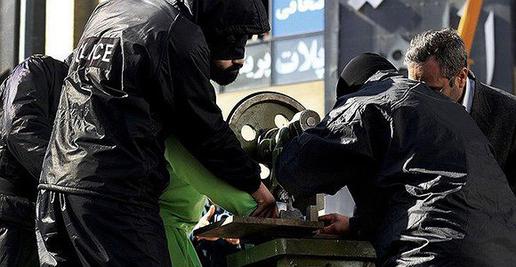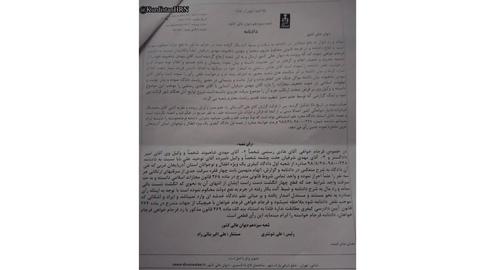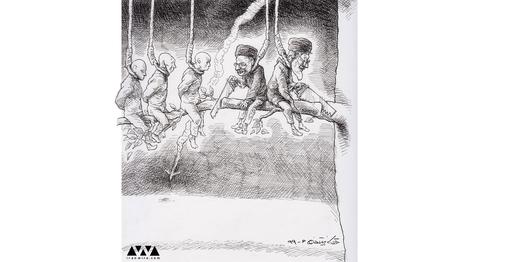In recent days fresh debate has swirled around an ancient, barbaric method of punishment still being used in the Islamic Republic of Iran. A court in Urmia has upheld the sentencing of three convicts to having their fingers cut off, allegedly for stealing. Amputation is one of the punishments for theft enshrined in the Islamic Penal Code but still newsworthy when it takes place, attracting criticism from human rights advocates and the wider public.
On Thursday, September 18, 2020, Kurdpa website reported that the Supreme Court had upheld the sentence of "amputation of four fingers of the right hand" for three men, Hadi Rostami, Mehdi Sharafan and Mehdi Shahivand, who are currently incarcerated in Urmia prison for robbery. The sentence was sent to the Urmian enforcement officials to carry out.
The news drew widespread condemnation and yesterday the judiciary attempted to deny it – too late, because as far back as July 2020 the Kurdistan Human Rights Network in July 2020 had published both the verdict itself and a copy of the Supreme Court’s original ruling.
Human rights campaigners fear this grotesque punishment may be being deployed in Iran more often than it is being reported. A Tehran-based lawyer told IranWire: "In the past these sentences were mostly carried out in public. But recently they have largely been out inside prisons and, of course, with other prisoners as spectators, so that they can learn a lesson."
An informed source told IranWire he had witnessed the punishment being carried out in Adelabad Prison in Shiraz in July this year. "The sentence,” he said, “was carried out on a young man who had been arrested imprisoned for burglary for the second time"
A Tehran-based lawyer told IranWire: "In previous years, these sentences were mostly carried out in public, but more recently, they are mostly carried out inside prisons and, of course, in the presence of prisoners as spectators, so that prisoners can learn a lesson."
“I Was Watching”: An Amputation Victim’s Story
The Abdorrahman Boroumand Center for Human Rights has been documenting amputations in Iran as they occur for years. Director Roya Boroumand told IranWire: "One of our projects has been to investigate cruel, inhuman, or humiliating treatment or punishment, including sentences carried out in different cities but not covered by the media.
“These sentences are often accompanied by harsh interrogation and torture. In some cases the defendants were even without a lawyer. We talked to the convicts and documented their stories."
One such victim, Mohsen Sabzichi, gave a testimony to the centre. He told researchers: "The device was covered in blood; no disinfection at all, nothing. The device was a guillotine. They tied my hand under it and hit the knob. I was watching as my fingers fell to the ground."
Another prisoner, Reza Safari, had both four fingers of his right hand and subsequently four toes of his left foot cut off for stealing. According to Article 201 of the Islamic Penal Code, the fingers are severed in the first instance of theft and part of the foot on the second conviction. "My fingers were amputated without anaesthesia,” he said, “with an electric guillotine. The device still had traces of blood on it which indicated it had been used many times.”
A Lifelong Punishment
The filthiness of the machine is a serious cause for concern. Article 79 of Iran’s Law on Execution of Islamic Sentences states: "Execution of punishments of amputation and removal of organs must be carried out by hygienic and appropriate means and conventional methods, in a way that inflicts the least harm on the convict and does not cause unnecessary damage."
"It seems the device with which the amputation orders are carried out is taken from one city to another," said Ms. Boroumand. "There is a team on hand to carry them out, under the supervision of the judiciary. They are based in Evin Prison, but travel to different cities to execute the sentences.
“The horrible, painful process of amputation does not take long and is over quickly, but this brief process affects the person’s whole life. With the loss of their fingers, people can no longer easily button their clothes or do their daily jobs.
“These people usually steal out of poverty and compulsion. This sentence only increases their need. Their chances of getting work are very low: no one hires them and their families are disgraced."
In part of his letter to the Abdorrahman Boroumand Center, Reza Safari described his life after the amputation of his fingers: "A worse situation awaited me outside the prison. Everywhere I went, everyone was watching me, and as I entered, everyone gathered around me – but then very quickly ran away again.
“I had no place, even among strangers, because of the amputation of my fingers, which was like a sign on my forehead. Despite all my efforts to find work, I did not succeed. I tried for more than six months without success.
“A lack of work and lack of income, my poverty and the hunger of myself and my family, led me to commit robbery again. A year after my release from prison on January 9, 2009, I was arrested again and convicted in Arak, and sentenced to the amputation of my left foot in such a way that I lost the toes."
Reports of Savage Punishment Met with Disbelief
Many people who receive the amputation sentence, Roya Boroumand says, do not believe it will actually be carried out. Mohsen Sabzichi told researchers he, for one, was in denial until the very last moment.
"Until a few years ago,” says Boroumand, “even when such rulings were reported in the media, people on social media called them rumors, and claimed such punishments are no longer being carried out in Iran. The authorities do not talk about it. About three years ago, when we were investigating this, there were 11 people facing this sentence in Arak prison alone.”
The lawyer Hossein Raeisi has so far represented two Iranians who received this sentence. In one case he was able to get the order overturned by the courts, but in another, in which the client stole a motorcycle from the parking lot of a house, the amputation went ahead at Darab Prison in Shiraz.
"Amputation is ordered in cases where the stolen property has been removed from its shelter [an Iranian judicial term for the place where any property is kept]," he said. "If gold is stolen from a safe or a car is stolen from a parking lot, the judge can order a ‘theft punishment’.”
Roya Boroumand and her colleagues have repeatedly complained to the Office of the United Nations High Commissioner for Human Rights, as well as the UN Special Rapporteurs on Iran and Torture, on behalf of some of those who have faced the sentence. "When such complaints are raised, the Islamic Republic systematically rejects and questions the UN’s rapporteurs.
"[This sentence] is not carried out in almost any other country in which the majority of citizens are Muslims. Religious authorities must have logic and courage, and accept that this punishment is inhumane and useless, and must be removed. Have they not adapted religious orders in the case of other issues – such as banking interest? Are they only silent about the punishments belonging to 1400 years ago that befall the poor and the vulnerable?"
visit the accountability section
In this section of Iran Wire, you can contact the officials and launch your campaign for various problems




























comments